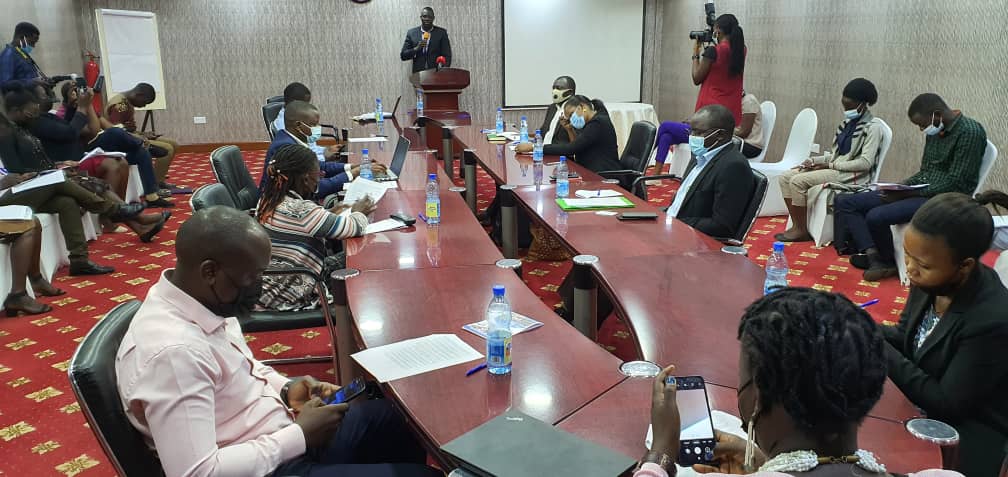The Civil Society Organisations (CSOs) in Uganda are concerned about the growing forced land evictions that are rampantly being meted against the people of Kiryandongo district and have called for a robust quick response.
In several news reports, it has been noted that more than 30,000 families living on approximately 9500 acres of land in Kiryandongo district in Western Uganda were forcefully and violently evicted from their lands in November 2017 despite their occupancy being legally recognized.
In a joint statement issued by Oxfam Uganda, Action Aid Uganda, The Uganda Association of Women Lawyers (FIDA-Uganda), Transparency International Uganda, and others on Tuesday, they said the issue was brought to the attention of the government which promised to deal with the situation under the then Minister of Lands Betty Olive Namisango Kamya but to this end, nothing has been done for the affected persons.
“We would like to call on the government to respect the principles of the constitution of the Republic of Uganda 1995. The constitution states that land belongs to the citizens of Uganda, and the right to own property is further recognized in the Constitution of Uganda under Articles 26 and 8A and Objective XIV of the National Objectives and Directive Principles of State Policy (NODPSP),” the CSOs noted.
The evictions which were further escalated in 2020-2021 when the COVID-19 pandemic followed by lockdown hit the country, paved the way for three multinational companies to carry out large-scale agribusiness.
“All evictions must be carried out in a manner acceptable by national law that is compatible with International Human Rights Standards and in accordance with principles of reasonableness and proportionality depending on the particular circumstances as stated in paragraphs 11 and 14 of the UN Committee on Economic, Social and Cultural Rights, General Comment No. 7 on the right to adequate housing: forced evictions,” they said.
Uganda has also ratified the International Covenant on Economic, Social and Cultural Rights (ICESCR) and African Charter on Human and Peoples’ Rights (ACHPR), which affirm this right, stating that it may only be encroached upon in public interest according to the law but in this case has not been procedurally respected by the government.
Prior to carrying out any evictions, especially those involving large groups, all feasible alternatives must be explored in consultation with the affected persons, with a view to avoiding or minimizing, the need to use force as stated in the UN Committee on Economic, Social and Cultural Rights, General Comment No. 7 on the right to adequate housing: forced evictions.
“Legal remedies or procedures should be provided to those affected by eviction orders. All the affected individuals have a right to adequate compensation for any affected property, both personal and real,” the CSOs emphasized.
It should also be noted that the economic and social rights, including the rights to food, housing, water, health, work and an adequate standard of living, are directly affected by land management decisions. These decisions can either ensure the enjoyment of these rights or lead to the weakening of social safety nets, thereby hampering the realization of these rights, which have been witnessed in the Kiryandongo land evictions.
“Overall, the respect, protection and fulfilment of the right to own property and adequate housing is therefore of utmost importance given the dire implications of its violations. The linkages between all these rights can ultimately be a major threat to the enjoyment of the right to life therefore the government should sensitively be cognizant of this.”
“We would like to further remind the government of its obligations; The obligation of States is to refrain from, and protect against, forced evictions from home(s) and land and this arises from several international legal instruments that protect the human right to adequate housing and other related human rights.”
The Civil Society said there have been cases of severe rape of women, illegal arrests, and gross violation of human rights by some security operatives in communities of Kiryandongo during the evictions.
“We condemn acts of rape, intimidation, illegal arrests, and gross violation of human rights meted upon communities of Kiryandongo by some security operatives whose sole aim is to serve and protect.”
The CSOs called upon the government to further take the following action to curb this situation:
- To revisit the land allocations made under the 1995 Presidential Directive to ensure that all subdivisions of ranches that were made are implemented through Kiryandongo DLB.
- Order Kiryandongo DLB make details of all subdivisions of ranches and land allocations to squatters publicly available, issue outstanding land allocation certificates and facilitate the land registration process and issue leaseholds to the land allottees.
- Immediately allow renegotiations (dialogues) between affected communities and multi-national companies to resolve grievances arising out of the forced evictions and inadequate compensations.
- Allow negotiations for those wrongly evicted from their lands to be returned to their lands, the possession of the lands restored, and compensation adequately paid for any loss of crops or developments they may have made on the lands.
- Government security operatives to desist from engaging in acts of gross violation of human rights that have been sporadically reported by the affected communities of Kiryandongo.
- Government to immediately release these lands back to the community who depend on them for their livelihoods and food.
- To immediately release legal representatives who have been engaged in supporting legal actions on behalf of the affected persons.
- To relocate the evicted communities to other suitable lands and provide fair and adequate compensation for loss of their lands, developments made thereon along with support for livelihood restoration as required under international standards.








